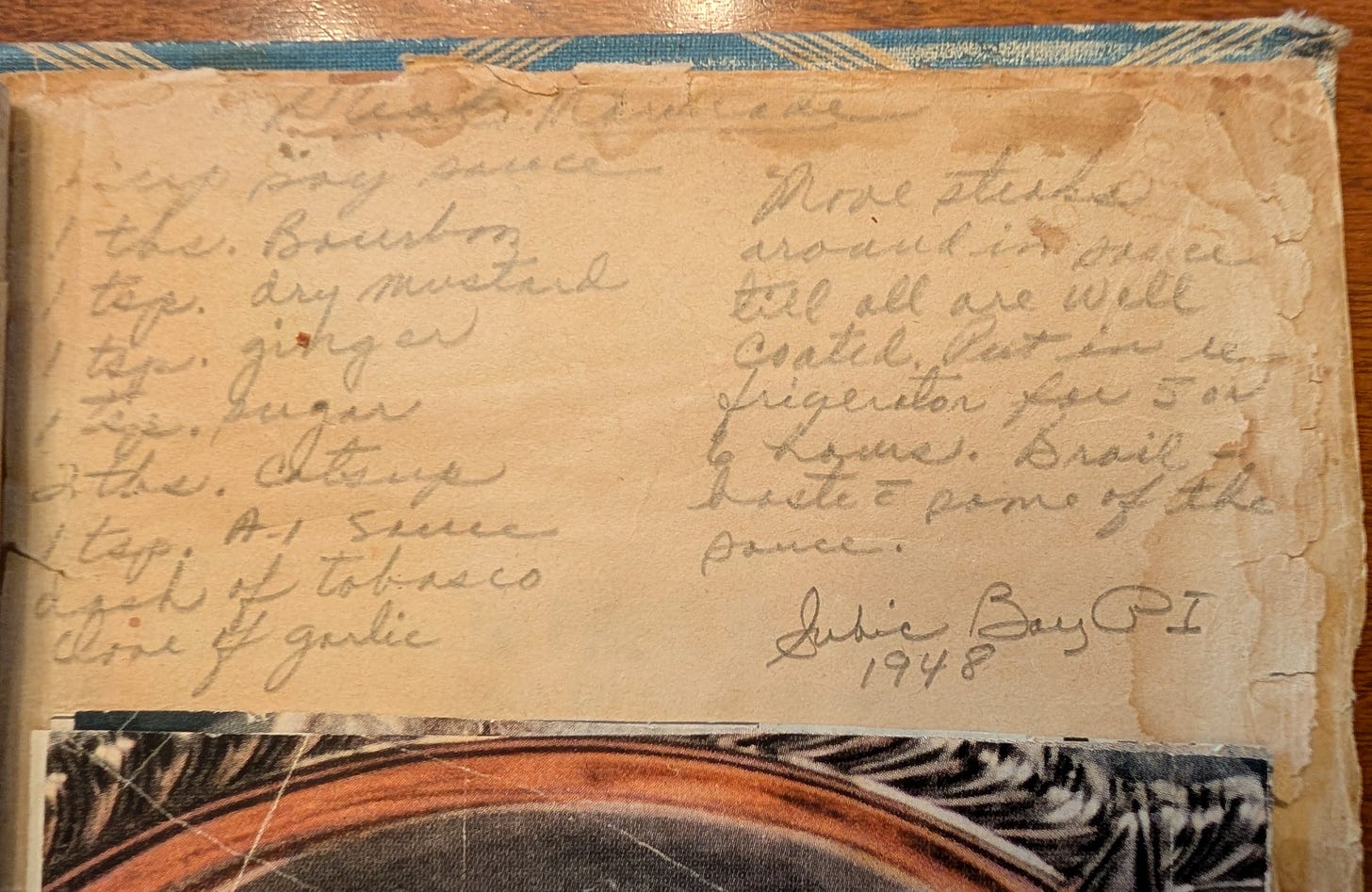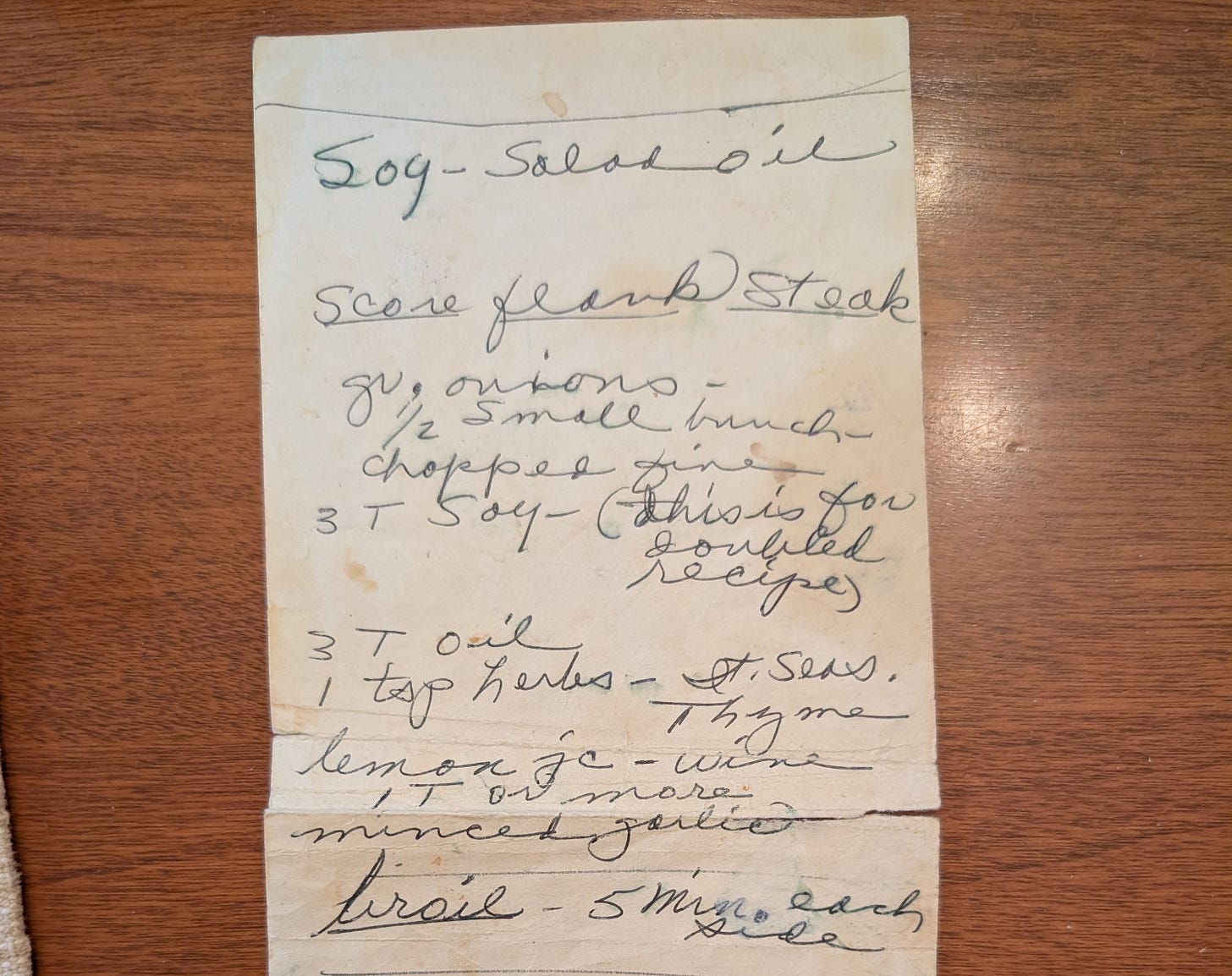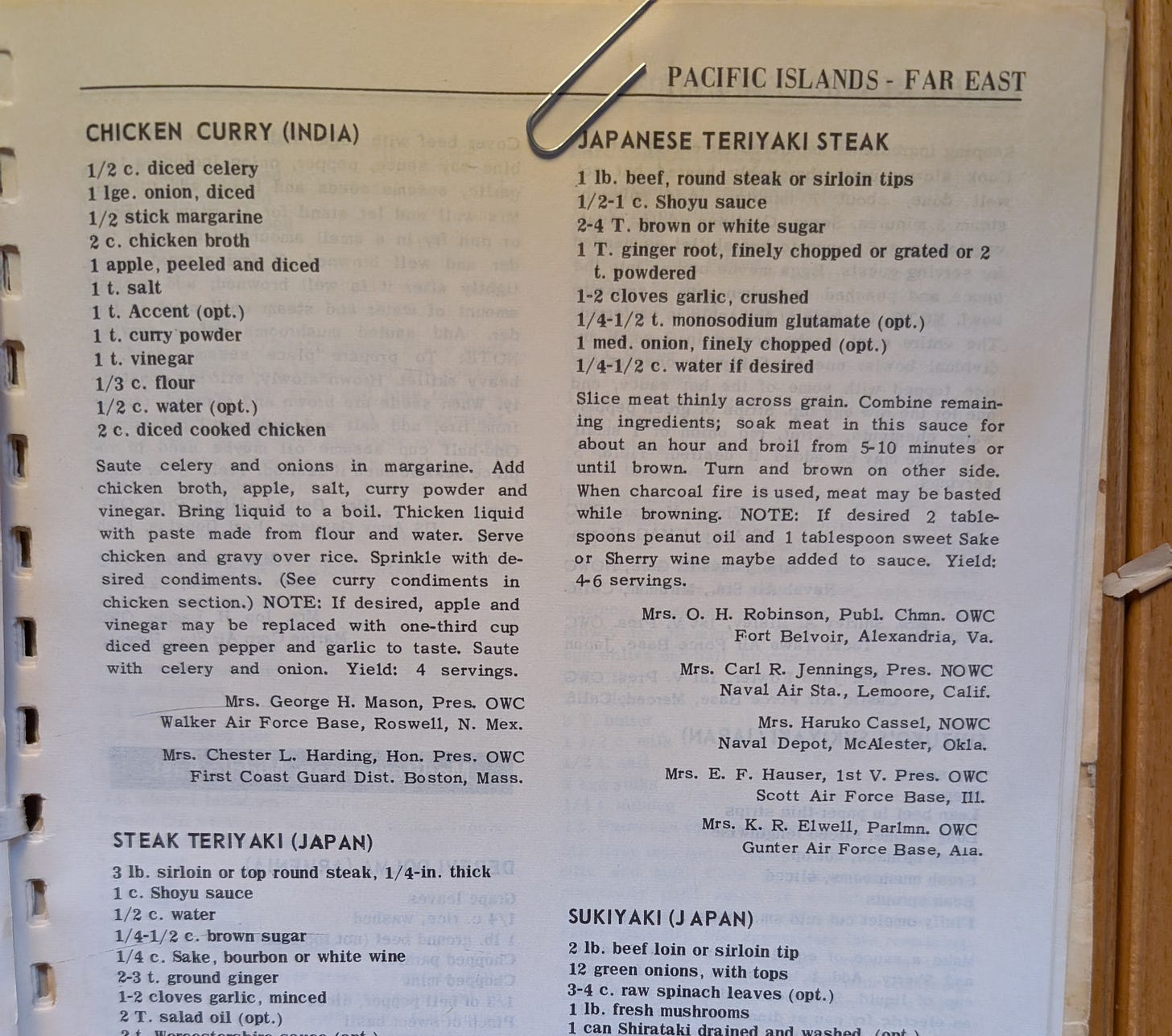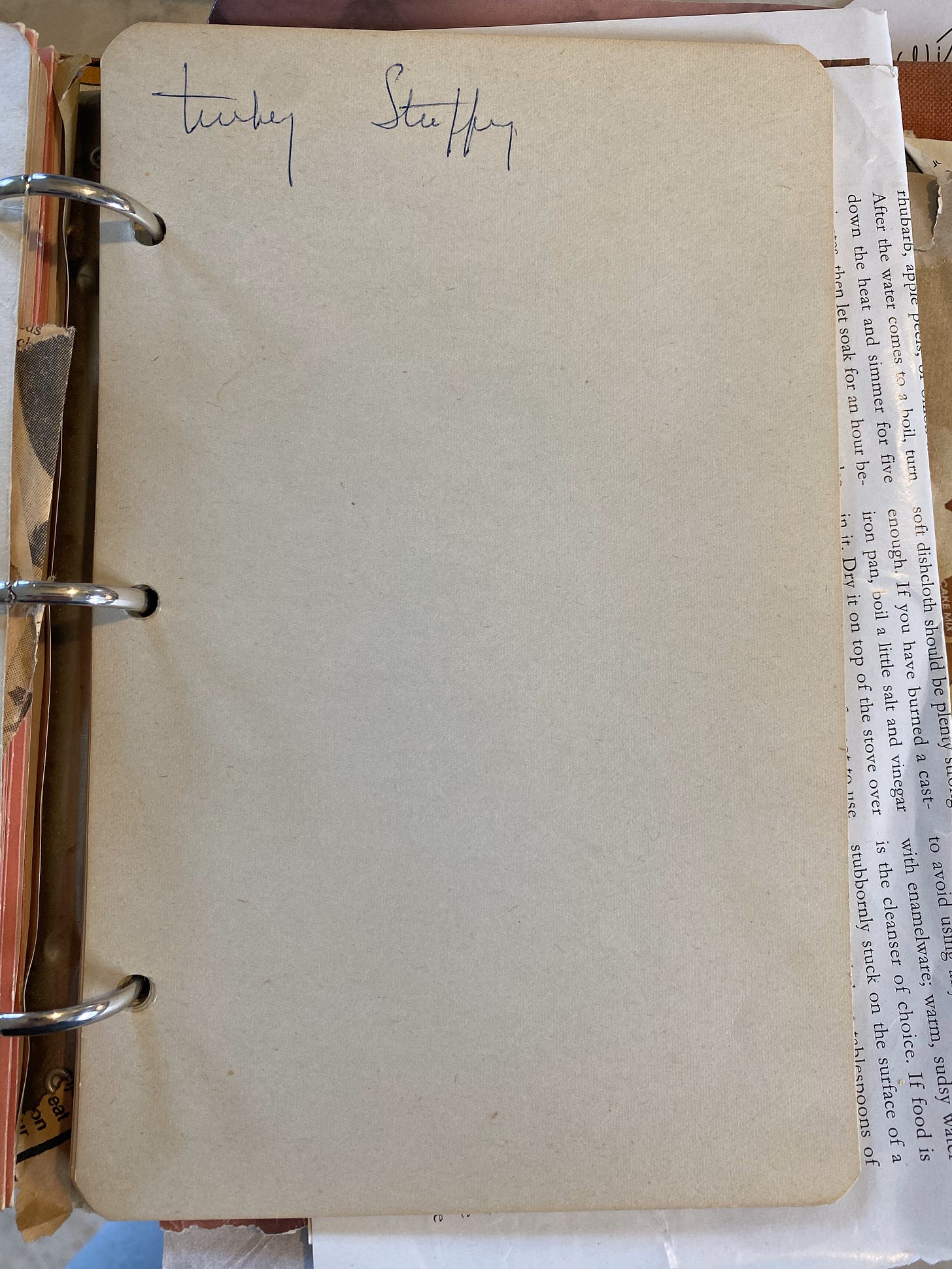My sister came over last week for a long-overdue traipse through our mom’s battered recipe folder together. Not only was it a simple joy to reminisce about so many recipes that sparked memories and stories as we went through, but since she’s older than me, she also has perspectives and memories a bit different from mine. And she’s got a better memory to begin with.
There were a number of highlights from that wonderful afternoon that I’ll draw from over time. The first reflection I want to share is an experience many can relate to with our beloved recipes collections: the mysteries they hold. Or, more accurately, don’t hold—in the case of recipes we think sure we have. Or those recipes we sadly missed the chance to get before it was too late (I always hate to say “before it’s too late,” as if an ominous nag, but it’s a reality we face with these recipes).
I guess this example hits both those marks.
I would have bet money that I’d find among the recipes in Mom’s folder her recipe for the marinated flank steak that my sister and brother and I remember mom making so many times
and it never occurred to me to ask my mom about the recipe, take notes for how she made it, where she learned it, all those things….
Among the folder’s recipes and those in the couple cookbooks she used most often are a few vaguely similar recipes—none quite right. They include:
This “steak marinade” jotted on the inside back cover of her 1948 edition of The Joy of Cooking; sounds quite good, but brandy, catsup and A-1 (which I still adore) not in her version
This unnamed note jotted on a scrap of paper at least includes scored flank steak, but the lemon juice and herbs not part of what we remember
The closest may be this “Japanese Teriyaki Steak” from a 1964 cookbook, attributed to military officers’ wives, of which my mom was one (an officer’s wife, not a contributor to that collection); the ingredients are close, though she cooked the steak whole.
Missing, lost, longed-for or never-collected recipes are a frequent theme in workshops and conversations about family recipes. It can definitely be the source of some anguish and regret to not have a specific cherished recipe. I have suggestions for a couple of ways to perhaps help temper that anguish a bit: sleuthing and re-creation.
Sleuthing is great for those who love puzzles, research, diving into rabbit holes. Whatever your starting point it, however much you know about the recipe, search for other examples of the recipe or something close to it. Begin piecing together elements from here and there that seem to most closely reflect what you remember. Ask family, friends, neighbors, others who may have had that dish many times as well and have input to share about the recipe’s elements. When enough is pieced together to have a semblance of a complete recipe, make it and see what you think. Then adjust, tweak, more research, etc., test again—repeat until you’re content with the results.
A number of examples of this have crossed my radar recently. In a workshop I lead in January, one of the attendees mentioned a recipe she’s been trying to piece together for a type of corn cake that was beloved in her husband’s family. She mentioned getting close, but not quite there with her explorations and tests. And added that she’s at the point of caring about that recipe more than even her husband is—she’s so enjoying the challenge of the search.
Another was a particular elaborate search, one that resulted in the book The Lost Ravioli Recipes of Hoboken: A Search for Food and Family. Laura Schenone took that goal of finding a ravioli recipe of her great-grandmother’s and dug deep to find it. It’s been a few years since I read the book but recall it being quite a dynamic story, full of research, family, cooking, connecting, travel, struggles…all the things.
Another option is to re-create the recipe: start from that same point of however much you know/remember about the recipe and work up a version of the recipe from there. Based on your memory, your sense of how the recipe had been made, adding some of your own cooking experience to help fill some of the gaps.
In the case of that flank steak my mom made so many times, that’s essentially what I’ve done for years—riffed on what I remembered about the flavors and preparation, and re-created it based on that point of departure. I have yet to commit that recipe to writing myself, it may be time to do so, if only for that important sake of having it to pass along to others.
My friend Cheryl shared a funny example recently. Flipping through her mom’s recipe notebook some time ago, looking for her turkey stuffing recipe, she came upon this:
Not just a lack of recipe, but a place set aside for the recipe that never got jotted down…as if her mom was reinforcing the mystery a bit. Looking through other recipes in her mom’s folder, she found a few other stuffing recipes, none of which exactly what Cheryl remembers, some with notes by her mom. She figured her mom referenced those other recipes to inspire her personal version and just never bothered to write her version down. With that starting point, she has pieced elements together, including her own memory of the dish, and has a pretty solid version that honors her mom’s turkey stuffing. “It has the homey flavor I remember, tastes like home,” she said.
What more can we want than that?
Regardless of which path you go down, I hope you’ll find comfort in getting however close you can to what you remember. There is plenty of comfort, appreciation and honoring of the original to be had in whatever form that cobbled-together version takes.






I love @Laura’s ravioli book and refer to it often in gathering and writing about culinary history! Thanks for sharing it and all the other practical tips for finding and recovering lost family recipes.
I love this - this is exactly what I'm doing. I'm lucky to be the family member who is 100% digitally astute and a foodie who loves cooking, baking, and recreating or reimagining our family recipes. I'm also adding the current generation's recipes now, so they don't have a chance of being lost! Last year I started The Dinner Bell to ensure our family recipes would live beyond the recipe box, a piece of paper, or a memory. My sisters and I have also asked our mom, aunts and uncles to guide us through their recipes - we make them, they mentor, so that when they've left us, we can make their recipes, with all their hidden unknown tweaks.